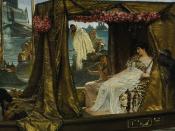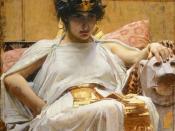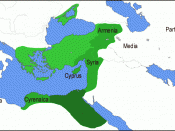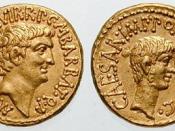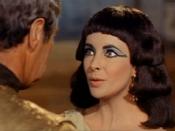Marcus Antonius, born c. 83 and died in 30 BCE , was one of the better known Roman leaders, likely because of his romance with Cleopatra and Shakespeare's retelling of his tale. As the son of General Marcus Antonius and Julia, he was the second cousin of Julius Caesar and thus became a powerful man. Antony participated in many military campaigns in his lifetime, and upon Caesar's death he became one of two main contesters of the throne. His life came to an end when his rival Octavian defeated him in battle at Actium and he committed suicide with his lover Cleopatra.
Marc Antony was an important man, but his relationship with Caesar was what truly led to his coming into power, and his whole life was directed by events out of his control. Marc Antony was a product of his age and family, nothing more.
One of the greater factors of Antony's coming into power was his blood relations, particularly that with Caesar.
Marc Antony's mother Julia was the cousin of Julius Caesar, making him the second cousin. In a time when blood relations and family lineage were so important, this obviously meant Antony was destined from birth to be in a position of power. He did not rise up through the ranks and earn his complete status, but rather was granted most of it by Caesar, as Plutarch wrote in his book Antony: And the influence which he gained with the peopleâ¦by the money which was supplied by Caesar, enabled him to make Antony, first, tribune of the people, and then, augur. And Antony's accession to office was at once of the greatest advantage to Caesar.
--Antony by Plutarch In the above quote Plutarch mentions that Antony's accession was advantageous to Caesar, which makes one pose the question: If Caesar had not wished it so and granted Antony the required funds, would Antony have still been capable of rising to office? One cannot say for sure what would've happened, but in hindsight, it's quite clear that Antony was incapable of accomplishing such a task without the support of powerful men.
The events in the life of another of Antony's blood relatives provides ample proof that Antony did not direct history, but rather took up with the winning team simply to make a name for himself. His grandfather was a famous orator who had supported Sulla , who was a ruthless leader with whom Pompey allied himself with. Pompey was Caesar's greatest nemesis, and Sulla had even intended to execute Caesar and would have done so had Caesar not left Rome in time. Although his grandfather had been supported Sulla, Antony saw Caesar's growing power and attached himself to the winning side. He was not a driving force of history, but rather traveled easily along in greater men's wake.
Because of his aligning himself with the triumphant side and his family connections, Antony rose quite high in power. So high, in fact, that when Caesar died, Antony took over. When it came time for Antony to make his own history, he failed miserably without someone it guide him by the hand. He was so reliant on others that he sought out Cleopatra's "love" or more precisely her support to stay in power, and it was his relationship with her that is the final major evidence that Antony was not a major influence on history but in fact was simply guided along by other people and events out of his control.
Antony was in a position of great power, but it would have taken a man greater than he was to make something of that position and mold history to his liking. However, Antony was unable to cope with having supreme power, and because of this he sought out (or perhaps was sought and snared by) Cleopatra. The truth about whether or not she truly cared for him died with her, but it is more than reasonable to assume a major part of their relationship was her trying to further expand her power and bring Rome and Egypt together. Antony was more than happy to be led by the hand by a woman, as Plutarch mentions in his book Antony: "So that Cleopatra had great obligations to her for having taught Antony to be so good a servant, he coming to her hands tame and broken into entire obedience to the commands of a mistress." Plutarch, Antony. The woman that Cleopatra was obligated to was Antony's first wife Fulvia, whom had also wrapped Antony around her finger, bending him to his will.
If Antony had not let Cleopatra direct the events of his later years than perhaps he might have proven to be a good leader, or perhaps he would not have lasted as long alongside Octavian as he had. As it was, though, it was her manipulations which he so willingly succumbed to that was his downfall, and ultimate proof that his life was guided by others' choices, not his own. It was more or less her meddling that led to the two of them, even with Cleopatra's and Antony's united armies, being decisively defeated by Octavian and Agrippa at Actium.
At this point, Antony could not have changed the flow of history even if he was twice the man. His death is the final proof that he was simply a tool of Cleopatra in his later years; upon hearing false reports of her committing suicide, he killed himself, knowing full-well he was nothing without someone to direct the flow of his life.
Antony was not a great leader. His power and great deeds came from connections through family and friends, the fact that he changed to the winning side to continue having power and wealth given to him, and Cleopatra=s great influence on him. The stage was set for him before he was even born, and he was led by the hand through his life by others, simply dragged through his time by the flow of history, nothing more
